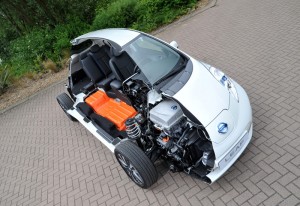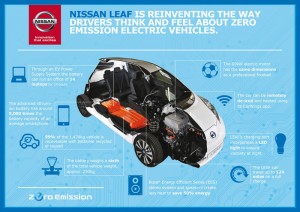
“Car tech turns over a new Leaf”… The world’s best-selling 100% electric vehicle is now packed with even more top technology;
- 100 engineering changes for 2013 Nissan LEAF bring innovative new consumer technology
- Football-sized electric motor drives Nissan LEAF for 124 miles / 199km per charge
- Use CarWings smartphone app or PC to cool/heat the Nissan LEAF cabin to a pre-set temperature
- SIM-based telematics system sends driving data & receives latest charging point information
- Sat-Nav packed with tech features including Google’s Send To Car and Points of Interest
- Bose Energy Efficient Series (EES) stereo system and speakers use digital technology to save 50% energy
Rolle, Switzerland (02 July 2013) – Nissan is reinventing the way drivers think and feel about electric vehicles – with the latest innovative consumer technology now built into the all-new Nissan LEAF.
The 2013 model Nissan LEAF, the latest version of the world’s most popular electric vehicle, has been created with the driver firmly in mind, putting some of the best in-car tech features available at their fingertips.
Nissan engineers from the UK, Europe and Japan have devised more than 100 engineering and technology changes, whilst refining many of the Nissan LEAF’s existing features to produce greater efficiency and even more pronounced eco-friendly performance.
At the heart of the Nissan LEAF is its CarWings telematics and entertainment system, connected to the outside world by a dedicated on-board SIM. This frees drivers from having to tether their own smartphone to provide the car with connectivity, and it is all controlled by a seven-inch resistive touchscreen. The majority of the 100 plus changes to the original Nissan LEAF – which sold more than 65,000 around the world – have come thanks to feedback direct from customers, or were inspired by comments in Nissan LEAF related and other car forums. One of the most important changes has been the work carried out on refining the algorithm used to determine the remaining “real range” of the car while travelling.
This algorithm now learns how the driver behaves behind the wheel and uses intelligent long-term logic rather than just responding to power consumption at a certain moment.

Other technology-related highlights include:
- The ability to ‘Call’ the Nissan LEAF to check its charging status before you set off on a journey
- Google Send To Car delivers routes from a computer/smartphone
- Sat-Nav en-route improvements show end-of-journey battery range
- List of nearby charging points is constantly updated through the telematic system
- Eco Mode button on steering wheel reduces acceleration and increases range
- On-screen ‘big data’ shows personal/worldwide Nissan LEAF energy savings
- Bose Energy Efficient Series (EES) stereo system has lighter woofer and digital amp to use less energy
- Four on-board cameras form a top-down 360-degree car view for easy parking
- Battery has around 5,000 times the capacity of an average smartphone
- Motor produces 254Nm torque, more than double that of the Lotus Elise
- New battery indicator showing percentage left in addition to a bar display
- LED light on charging flap to ensure good visibility at night
- Can be warmed in winter or cooled in summer via CarWings app from your bed or office
- Eco routing can plot directions to save energy and increase range
- LED headlights last five times longer than traditional halogen bulbs
- RSS reader reads the news, weather or info on the go from your favourite RSS feeds
- Seats and steering upgraded for European drivers
Malcolm Holmes, Manager, Audio, IT, Instruments and Switch Design: “Technology is becoming increasingly important for our customers and Nissan is keen to ensure all the technology we bring to the Nissan LEAF is innovative and adds excitement.
“We do not put in gimmicks. All technologies give a true value for the customer and all of the features and functionality we have placed in the all-new Nissan LEAF genuinely increase driving pleasure.”
Safety is paramount on the Nissan LEAF to demystify common concerns often raised by potential buyers- including not being able to drive or charge the car when it is raining or wet. All high voltage power is safely placed outside the cabin with a dedicated 12v battery used to work everything in the driver and passenger spaces such as the windows, switches and in-car entertainment system.
Source; Full Nissan Press Release
